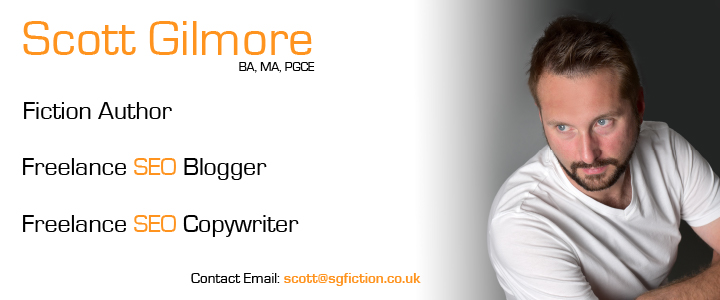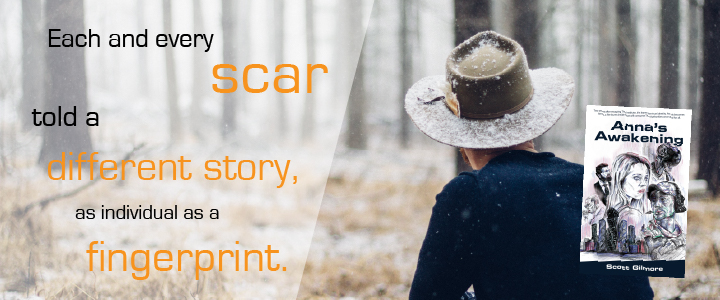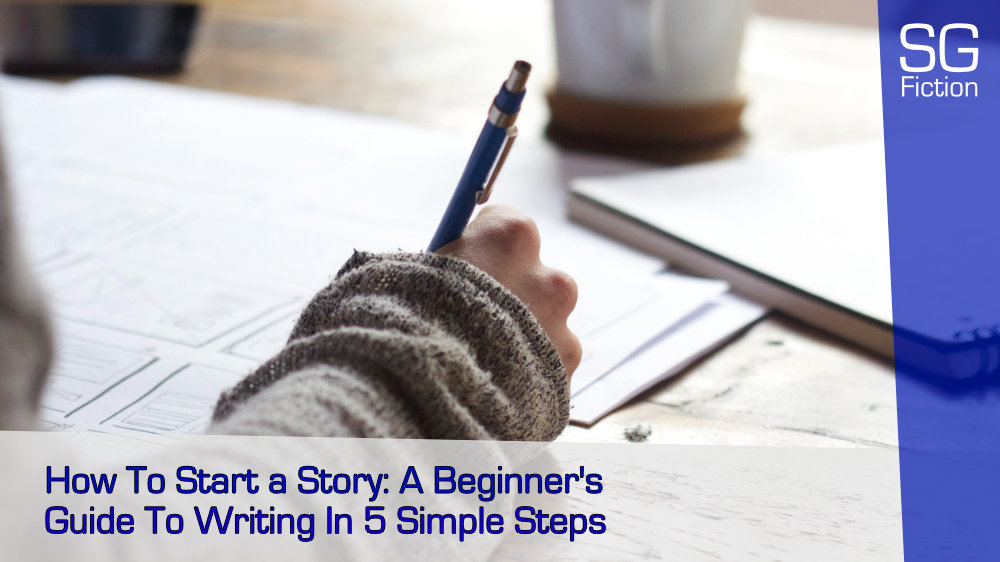I believe that everyone has a story to tell, so here is how to start a story in five simple steps. If you’ve never written before, follow these pointers to get started on your writing journey.
In this How To Start A Story article, you will find tips in the following areas:
- How having a story outline can help lead you through the process of writing from beginning, to middle, to end,
- Why creating compelling characters is a must to ensure your reader stays engaged and will follow them throughout the story you tell,
- How composing a detailed setting is vital to give your story real roots and your characters a world to explore,
- Why setting aside time to write is crucial to establishing a routine that is dedicated solely to your pursuit of finishing the task at hand,
- How sharing your author story online can help grow an author platform and provide much-needed support or advice through the tough times,
Read the rest of the How To Start a Story article and share it with a budding writer. Help them share that story they’ve always wanted to tell.
Many beginner writers have asked for tips on how to start a story. As a teacher, I have helped young people who believe that ‘can’t write a story’. For those who have never taken the step to write a short story, the idea of writing a novella or full-length novel may seem out of reach. However, you will never write that debut book unless you make a start.
I have worked with children, young people and adults who believed they ‘couldn’t write’. Whilst the simple answer to this is to say, ‘there is no such word as can’t’, those people truly believed that the idea of writing a story is beyond them. They will believe that they are:
- Not talented enough,
- Not ‘well-read’, or
- Don’t know how to start a story.
I have always been a person who has told those whom he works with that everyone has a story to tell. There is not a person on the planet who is beyond writing a novel. Yes, they may not secure a multi-book publishing deal with a major publishing house, but they have a story to share with the world.
The beauty with the publishing world today is that budding writers of all ages can utilise social media networks and resources like Kindle Direct Publishing to publish their stories in a simple, direct-to-consumer manner. Where the search for an agent and receiving repeated rejection letters from agents or publishers may rightly seem daunting for the beginner writer, there are other options available. Therefore, by exploring these options, writers who are just starting their journey can write their stories and share them with an audience around the world.
In this creative writing blog article, I want to focus on those writers who have recently decided to take up the pen for the first time. I want them to find five useful and applicable fiction writing tips that they can take away today and see results. It is only by seeing and experiencing success that beginner writers will want to return to their work in progress time and time again until they reach those words, ‘the end’.

Start With A Story Outline
The first point to approach when considering how to write a story is that of a story outline. When reading creative writing blogs online, a beginner writer could be forgiven for feeling somewhat overwhelmed when it comes to plotting, story and character arcs, or the idea of introducing subplots.
The most simple step to take is that of setting out what happens in your story concisely with as much detail as you feel you can include at the time. It would help if you considered what key events happen in:
- The Beginning,
- The Middle, and
- The End.
If you have the idea for a story, it may come from experience, a character talking to you, or a random stimulus that you can’t put your finger on. The key here is to put down what you think the main events are without worrying about whether the story is interesting or ‘good’ enough. You can always revisit the document and add details to spice it up, but, at this stage, you need to get it down.
Create Compelling Characters
The guides through any story are the characters you create. Whether they are male characters, female characters, or fantastical creatures, it doesn’t matter. Either way, the reader needs to be able to relate to the character in some way.
Your reader may not have been a detective, trying to solve a crime committed in a gangland feud, but they will likely:
- Have experienced similar emotional responses to events around them,
- Identify with elements of the character’s personality, and
- Enjoy learning about who the character is and what it is that drives them to succeed.
By ensuring that your characters have concrete foundations, such as those laid out below, you will be one step closer to creating compelling characters to include in your story.
- Goals: Every character needs to have goals that drive them in life. Give your protagonist goals that are organic to them as people,
- Strengths: We are all blessed with skills and abilities, make sure you give a few to the characters in your story,
- Flaws: Lately, there have been characters who have little or no weaknesses in fiction and on the screen. Don’t fall into this trap! To make your characters relatable, we need to see that they work for the talents or abilities they have,
- Obstacles To Overcome: When watching some recent TV series and movies, we see characters who don’t have to work to overcome the challenges that are laid out before them. Unfortunately, this leads to forgettable stories that don’t

Compose A Detailed Setting
In the age of technology, we have multiple tools at our disposal to help craft detailed settings. The world around us, during Covid times, has meant that travel and experiencing foreign cultures have become incredibly limited.
These restrictions on travel can mean that the writer is unable to experience potential settings for their story first hand. However, with the use of Google Street View and Google Earth, writers can walk the streets of foreign cities from the comfort of their own home. This is not ideal, but it allows you to include:
- Street Descriptions: By using Street View, you can type in the name of the specific street and move down the road as though you were there. By using the rotational views, you can compose descriptive text about how the character may feel if there and how the citizens use the street,
- Building Descriptions: The best use of technology to remotely view settings is to describe buildings. If you have a character walk down a particular road, you can choose some specific points of interest that can add details to the text and give your story real grounding,
- Landscapes: With Google Earth and Google Maps, you can experience larger landscapes from a birds-eye view. By using the 3D modes and zoom functions, an author can almost utilise a drone to fly over the areas they wish to use as settings in their story.
Whichever tools or methods you use to compose a setting for your book, the world you craft must have depth and detail. As your characters will inhabit and explore this world, it has to be fully three-dimensional, with contours and textures that you would experience in real life. Therefore, when your character guides the reader around the world, they can share it too.
How To Start a Story? Set Aside A Time To Write
If you want to start a story of your own, the most crucial element to include is a regular, set time to write. There is little point in planning, researching, and crafting characters to then hope to squeeze in X minutes when time allows. Unfortunately, you will make little progress and find yourself losing focus.
The idea of setting aside a specific time and place to write is one that forces your mind to commit to the task at hand where you treat writing as a job, even for an hour or two. By doing so, you will hope to:
- Limit or remove distractions,
- Have a specific target that you wish to achieve, and
- Feel a sense of achievement – giving you a boost for the next writing session.
Writing a story can be a long process for some people. This means that tasting success and feeling a sense of achievement is paramount. If you are a beginner, you may have a lower level of confidence than a more experienced writer. Therefore, if you feel that you have not achieved, you may give up sooner.
Don’t let this happen to you. Set aside a time to write and be realistic about what it is you hope to achieve. By doing so, your writing will go from strength to strength, and your book will be written in no time.

Share Your Story Online
There is no doubt that developing an online writer profile is a crucial tool that can be used to promote your work, and also you as a writer. In the current climate of social media networks, it is vital that those of you who want to take writing more seriously create relevant author social media accounts. It doesn’t matter whether you are a hobbyist or someone looking to chase down a publication deal, by putting yourself out there, you have access to:
- Helping Hands: Believe it or not, many fellow writers can be excellent sources of advice or help. By sharing what you do, you could open yourself up to a world of helping hands who can support you through good times and bad,
- A Promotional Channel: No doubt sharing how you write your book, the progress you make, and upcoming publication dates can help you to get your work out there. Whether you give away free kindle books or look to sell them online, letting an audience know about the books is critical, and
- An Author Persona: One of the most basic creative writing skills you can look to forge is to believe in yourself as a writer. By approaching writing in a manner where you take yourself seriously as a writer, it can only lead to a more focused approach to your craft.
Yes, this point may not be seen as how to start a story in the traditional ‘fiction’ sense. However, by documenting your journey as a writer, you are beginning your story. Whether you go on to sell a million books or a few dozen, it doesn’t matter. Document and share your writing story with the world. You won’t regret it.
How To Write A Story: The Takeaway
Taking that first step to write a story is enormous. There is no doubt that it can be incredibly daunting for any budding storyteller, but there are millions of writers around the world who are in your position, no matter how experienced they are.
Writers with the reputation of J.K. Rowling or James Patterson will always feel an air of trepidation about how to start a story. This especially prevalent when the seed has just begun to germinate for the first time. There is no ‘right way’ to start a story. As the writer, it is up to you to choose where you begin to introduce the reader to the character and the point in their life where we pick up their journey.
The main point of how to start a story is for you, the budding writer, to start writing in the first place. Therefore, by applying the points I have laid out above, I sincerely hope you start writing that story you have always wanted and share it with the world.

